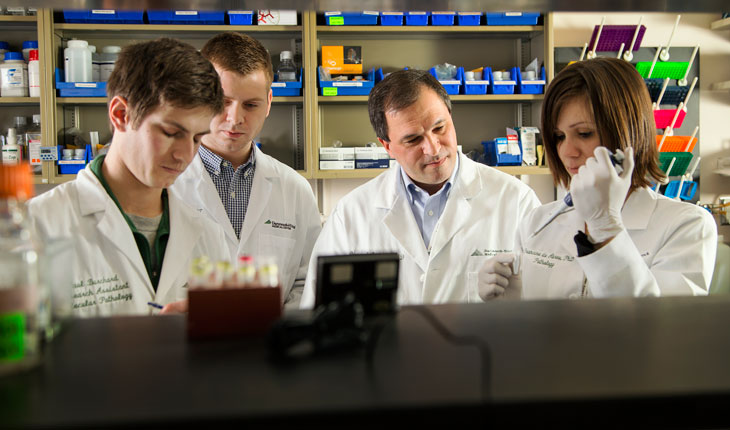For Release: March 24, 2014
Contact: Donna Dubuc (603) 653-3615 Donna.M.Dubuc@Dartmouth.edu
Dartmouth Cancer Researchers issue State-of-the-state on Genetic-based Testing and Treatment for Breast Cancer
(Lebanon, NH 03/21/2014)—Dartmouth researchers at its Norris Cotton Cancer Center have compiled a review of the role that information gathered through genetic testing plays in the diagnosis and treatment of breast cancer. The paper entitled "Personalized Therapy for Breast Cancer" was accepted on March 17, 2014, for publication in Clinical Genetics. The paper discusses targeted therapies, new biomarkers, and the quality of commercially available testing methods.
Genomic testing is changing the way breast cancer is diagnosed and treated. By examining a woman's genes to look for specific mutations or biomarkers, treatment can be personalized to the tumor cell's biology and a woman's genetics.
"A personalized approach increases the precision and success of breast cancer treatment," said Gregory Tsongalis, PhD, director of Molecular Pathology at Norris Cotton Cancer Center and lead author of the paper. "Molecular profiling exposes a tumor's Achilles' heel. We can see what messages the tumor cells are receiving and sending. It is a biological intelligence gathering mission in an attempt to interrupt the disease."
According to Tsongalis large scale genetic testing of breast cancer is not yet part of routine clinical care as it is with lung and colon cancers, even though he and his team run a genetics laboratory for routine cancer care. Genetic testing according to Tsongalis is a powerful weapon in the diagnosis and treatment of breast cancer.
With results from the genetic testing of a tumor cell's biology, clinicians categorize breast cancer in ways that allow them to select the most effective treatments. Based on genetic biomarkers, there are three categories of breast cancer:
- ER-positive breast cancer needs hormones, such as estrogen to grow. Estrogen fuels cancer cell growth, stops cancer cells from dying, and helps the cells lay down roots to maintain blood supply for tumors. ER-positive cancers are less aggressive and often treated with drugs that are selective estrogen receptor modulators (SERM), such as Tamoxifen, Raloxifene, Toremifene and aromatese inhibitors (AIs) such as Letrozole, Anastrozole and Exemestane. SERM drugs block estrogen from telling cancer cells to divide and grow; they have been shown successful in treating as well as preventing ER positive breast cancer. AIs block intake of estrogen in the system and reduce estrogen levels in serum, tissue, and tumor cells. AIs are commonly used in post-menopausal women.
- HER2-positive breast cancer cells contain large amounts of protein that help them grow and multiply. Medications turn off the production of protein to stop tumor growth and kill cancer cells. HER2 treatments include Trastuzumab, Laptinib, Pertuzumab, and Trastuzumab Emtansine.
- Triple negative (ER-negative/PR-negative/HER2-negative) breast cancer is the most aggressive type and has the poorest clinical outcome. There is no approved personalized therapy for triple negative, but research has identified six subtypes of tumors. This is the first step in identifying biomarkers that can lead to the development of personalized treatments.
"Genomic testing of breast cancer has expanded our understanding of the disease process and has proven more effective than traditional laboratory tests," said Tsongalis. "At NCCC all of our breast cancer patients are tested for abnormal copies of the HER2 gene using specially designed DNA probes."New biomarkers and the reclassification of cancers based on these biomarkers has led to the development of new, effective treatments that can be personalized to an individual breast cancer patient."
Tsongalis operates pathology laboratories at Norris Cotton Cancer Center that conduct routine clinical tests for 50 known genetic mutations on several different types of human cancers. His laboratory also conducts genetic analyses for clinical trials.
About Norris Cotton Cancer Center at Dartmouth-Hitchcock
Norris Cotton Cancer Center combines advanced cancer research at Dartmouth and the Geisel School of Medicine with patient-centered cancer care provided at Dartmouth-Hitchcock Medical Center, at Dartmouth-Hitchcock regional locations in Manchester, Nashua, and Keene, NH, and St. Johnsbury, VT, and at 12 partner hospitals throughout New Hampshire and Vermont. It is one of 41 centers nationwide to earn the National Cancer Institute's "Comprehensive Cancer Center" designation. Learn more about Norris Cotton Cancer Center research, programs, and clinical trials online at cancer.dartmouth.edu.
# # #
